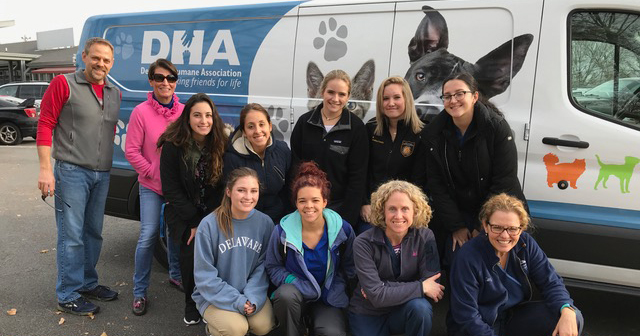


One Health Clinics for those in need
Photo courtesy of Kristin Jankowski December 13, 2017
UD pre-veterinary students help Delaware Humane Association with One Health clinics for low-income residents
Eight undergraduate students studying pre-veterinary medicine and animal biosciences at the University of Delaware have teamed with the Delaware Humane Association (DHA) to offer One-Health Clinics to low income Delaware residents at the Henrietta Johnson Medical Center in Wilmington.
The clinics have been held the first Saturday of the month since October and participating residents receive free vaccinations and health screenings for their pets while at the same time allowing the undergraduate students to gain a valuable hands-on, real-world learning experience.
The One-Health concept is a term applied to a transdisciplinary approach to health research and outreach that involves human, animal and environmental factors.
These clinics put the concept to use by not only screening and vaccinating the pets, but also providing education to the pet owners on healthy eating and living, provided by UD Cooperative Extension representatives, and also allowing the pet owners the opportunity to learn about services provided at the Henrietta Johnson Medical Center.
Kristin Jankowski, one of the head veterinarians for the clinics, said that the clinics have provided a great opportunity for the students to interact with pet owners face to face.
“Normally, for me in general practice, if we have an undergraduate student helping, they’re not interacting with the clients,” Jankowski said. “They might be drawing up vaccines or they might be helping hold the animals but they’re not part of the learning process or the didactic part between the veterinarian and the client. This is not just a vaccine clinic. It’s a whole exam. It’s talking to the owners about risk factors for diabetes, osteoarthritis, dealing with ear and skin disease. We’re also talking about disease transmission with parasites and their kids, all kinds of things like that.”
Leah Ferguson, a sophomore studying pre-veterinary medicine and animal biosciences in UD’s College of Agriculture and Natural Resources, was one of the students involved in the program and said that her favorite part of the clinics has been the opportunity to help low-income pet owners.
“I’ve always said that once I become a vet, I want to give back and help people who can’t afford it because I know my mom struggled a lot with vet bills and getting my dogs to the vet,” said Ferguson. “It’s something I’ve always wanted to do and now I have the opportunity to do that while still being an undergrad. Since this is the first year of the program, hopefully it grows and I can give back into it once I graduate and get on my own feet.”
At the Henrietta Johnson Medical Center, the UD students and DHA staff are joined by students from the University of Pennsylvania School of Veterinary Medicine and they set up four stations that the clients rotate through.
The first station is where clients sign in and give their pets medical history. The second is an exam station. The third is where the pets get medication and a rabies certificate and then the final discharge station is where extra educational materials are provided, both on human and pet health, and where further appointments can be set up for both.
Jankowski said that the UD students have been getting progressively more involved with each clinic.
“At the end of their internship, they can administer the vaccines if we feel they’re up to speed for vaccines that can be administered by a non-veterinarian which is basically everything but rabies,” said Jankowski.
In the beginning, Jankowski said that drawing up a vaccine was very challenging for the students but they have been showing growth which each clinic.
“Now they draw up the de-wormers, they help record data and they help restrain,” Jankowski said. “They have a certified veterinary technician working with them and so they’ve been helping them deal with interpreting body language of the animals and safe restraint and assisting with holding for blood draws. We taught them how to run the laboratory tests because we have some basic lab tests that we’re running such as heartworm tests and leukemia screenings.”
Lesa Griffiths, the T.A. Baker Professor of Agriculture and Natural Resources, said that the experience has been great for the students involved and that their involvement goes beyond the clinics.
“Essentially they’re taking a course,” Griffiths said. “They do bi-weekly reporting into me about their experience and what they’re learning as part of the clinic. So not only are they doing the clinics on Saturdays but they have also met during the week to organize supplies. Kristin sends them regular readings on what’s going on in veterinary medicine or things they need to be concerned about relative to the clinics. They have extra hours doing anything from writing thank you notes to all the donors of the veterinary medical supplies for these clinics or volunteering up at the shelter so they’re getting a broader experience.”
Jankowski said that it has been great partnering with the UD students and she is looking forward to continuing the clinics into the winter and spring of 2018.
“A lot of the students said in the beginning they were a little worried as to what they would see and experience but they all came away really feeling warmly towards the clients and their desire to help their animals, which we all did. It was amazing,” said Jankowski. “These are people that really want to help their pets, they just don’t have the resources.”
Contact Us
Have a UDaily story idea?
Contact us at ocm@udel.edu
Members of the press
Contact us at 302-831-NEWS or visit the Media Relations website

